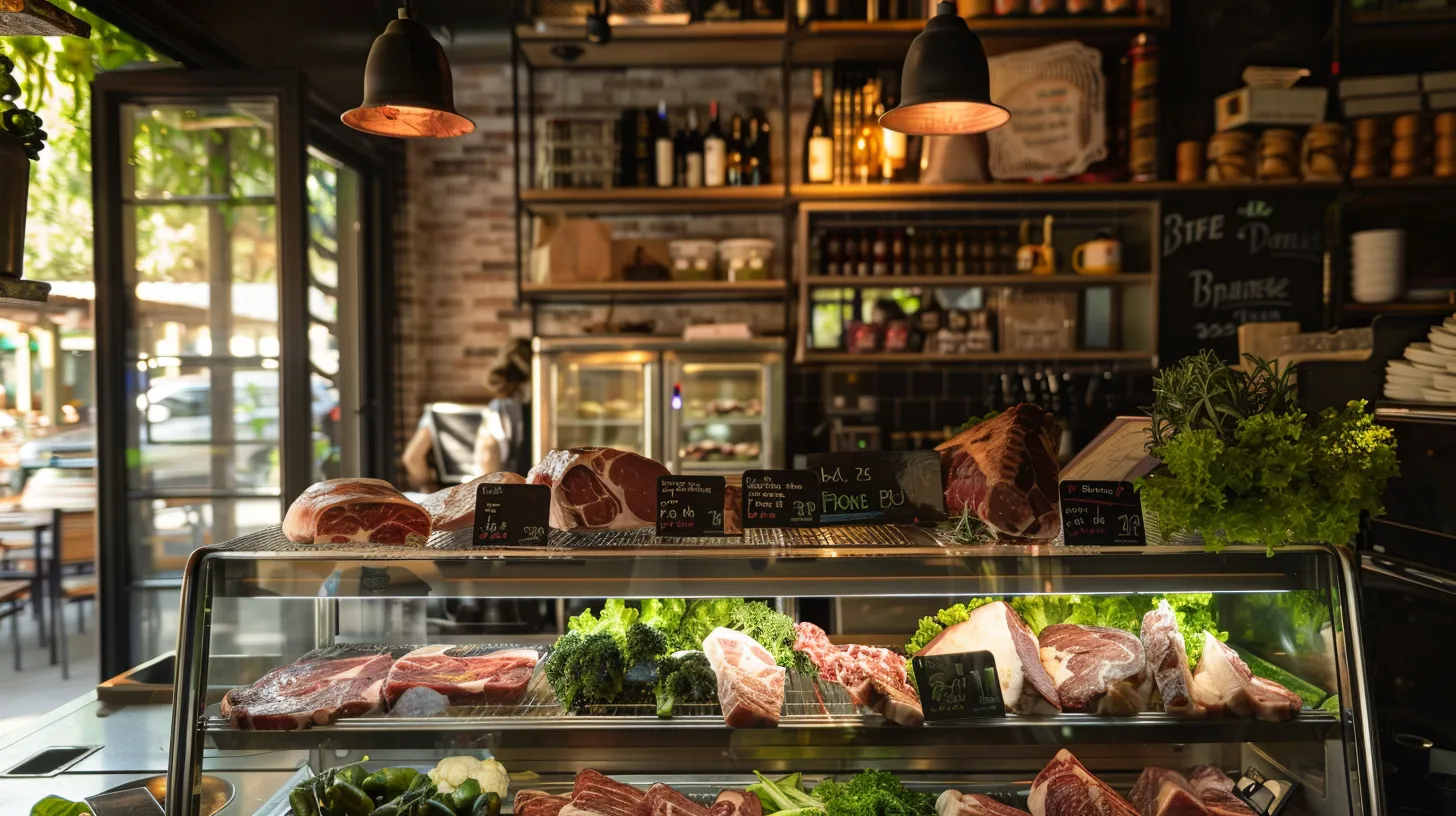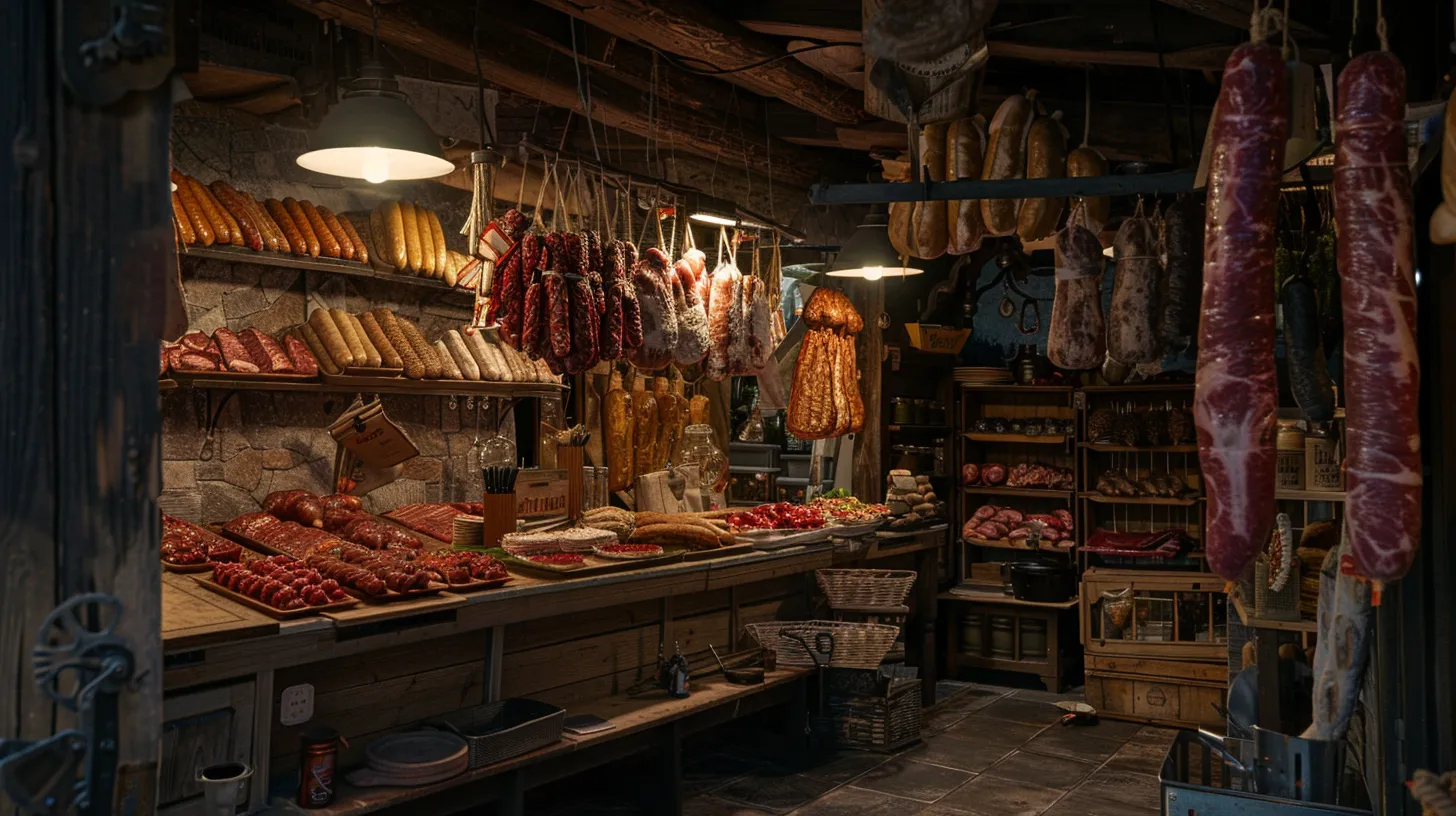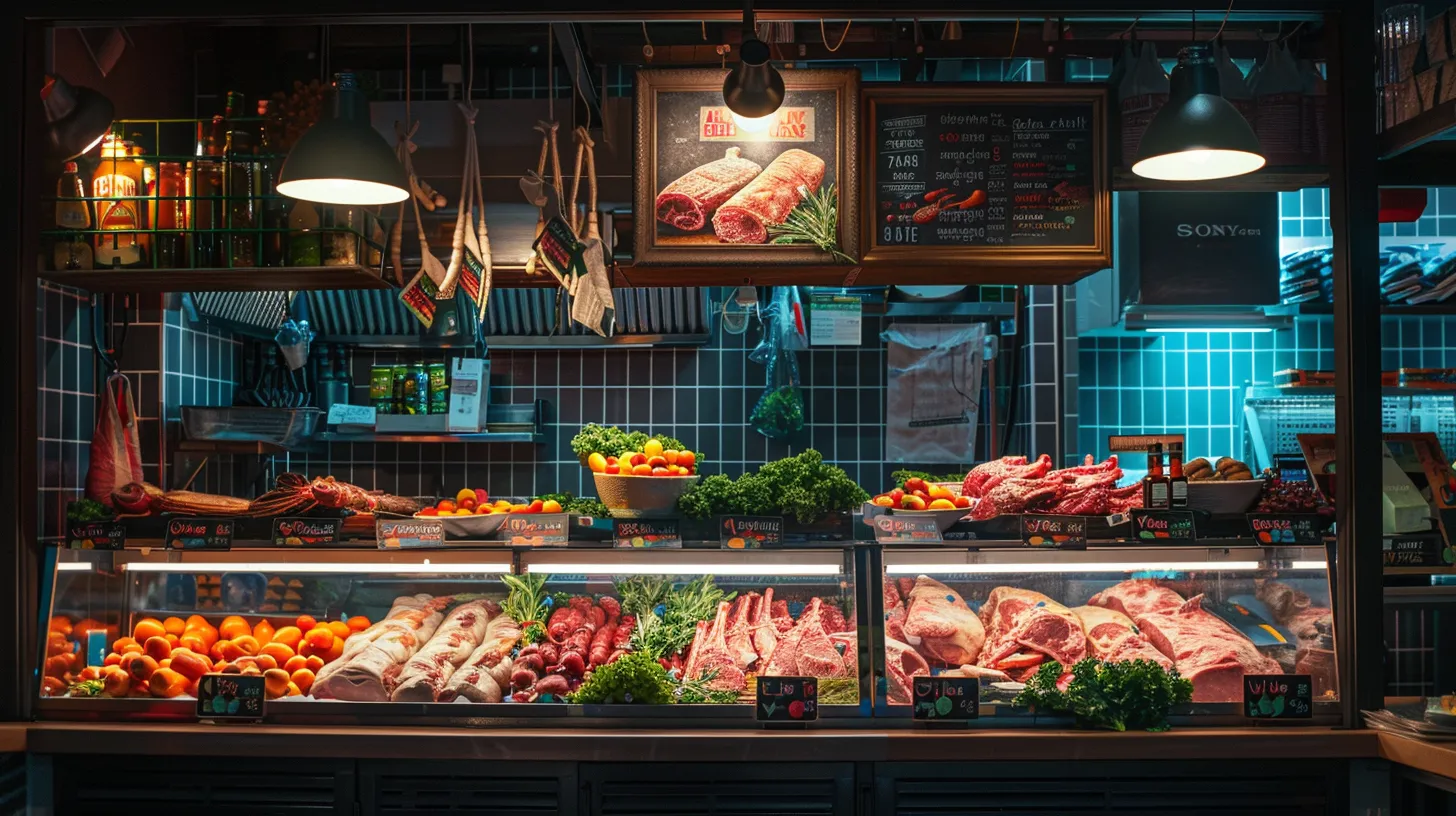Finding affordable meat markets can feel overwhelming, especially when seeking quality options. Many consumers believe that supermarkets offer the best prices, but local meat markets often have hidden gems such as rack of lamb, chuck steak, flank steak, and strip steak at lower prices. This blog post will highlight the benefits of shopping at these markets, provide tips for identifying them in your area, and compare their prices with supermarkets. By reading this content, you will gain insights on where to shop for budget-friendly meats and cooking tips for your next barbecue, helping you make informed purchasing decisions.
Key Takeaways
- Shopping local enhances quality and freshness compared to supermarket offerings
- Supporting local meat markets boosts the community economy and fosters job creation
- Transparent sourcing practices build trust and confidence in meat quality
- Engaging with knowledgeable butchers enriches the shopping experience and culinary knowledge
- Seasonal promotions and bulk purchases offer opportunities for saving while enjoying quality products
Understanding the Benefits of Shopping at Local Meat Markets

Shopping at local meat markets provides distinct benefits that elevate the dining experience. With an emphasis on freshness and flavor, items like loin cuts and ground beef often outperform supermarket offerings. These markets also support the community economy, promote transparency in sourcing quality products, and offer a broader selection, including our specialties like pork ribs and various pork options. Additionally, finding a meat market near me ensures you have access to the best local produce. Each discussion point highlights the value of choosing local for discerning consumers.
Freshness and Flavor: Why Local Is Better
Shopping at local meat markets provides access to superior options like sirloin steak and breakfast sausage that often surpass supermarket selections in both freshness and flavor. Local sources ensure that products are typically harvested and processed within a short timeframe, resulting in a taste that reflects quality. Furthermore, paying a fair price for these cuts often means supporting small, family-run brands that prioritize quality, establishing a connection between the consumer and the producer.
In addition to freshness, local meat markets offer a diverse range of products, including specialized cuts and unique offerings that may not be found in larger chains. Consumers often find that purchasing from local vendors provides insights into the ranching practices behind the products they enjoy. This transparency fosters confidence in sourcing, making it easier for discerning customers to choose meats that align with their values while savoring richer flavors that enhance their meals.
Supporting Your Community Economy
Choosing to shop at local meat markets plays a vital role in boosting the community economy. For example, when a consumer purchases a pound of top sirloin from a neighborhood butcher, the funds stay within the local economy, supporting families and small businesses instead of large corporate chains. This direct financial support fosters job creation and sustains the livelihoods of those involved in the retail process, from butchers to delivery personnel.
Moreover, local markets often prioritize sustainable practices and responsible sourcing, minimizing waste through careful packaging that resonates with environmentally conscious consumers. By purchasing fresh cuts from nearby establishments, residents of New York City can feel assured that their choices positively impact not just their meals, but also the overall health of their community. Engaging with local meat vendors allows consumers to forge connections while enjoying high-quality products, reinforcing the importance of supporting local economies.
Transparency in Sourcing Quality Products
Local meat markets offer a level of transparency in sourcing that is often absent in larger grocery chains. Customers can directly inquire about the origins of their meat, including whether it is free from hormones and how the animals were raised. This open communication creates trust, allowing consumers to make informed decisions about the fat content and quality of the meat they purchase, ensuring it aligns with their dietary preferences and values.
Engaging with local vendors not only means accessing fresher products but also having the opportunity to receive insights from knowledgeable staff, often including chefs and butchers with firsthand experience. By subscribing to a market’s newsletter, customers stay informed about new arrivals and special cuts, making it easier to explore different meat options. This direct relationship enhances consumers’ overall shopping experience, helping them discover flavors and qualities that elevate their culinary endeavors.
A Wider Variety of Choices Compared to Supermarkets
Local meat markets often provide a wider variety of choices compared to supermarkets, catering to the diverse tastes and preferences of consumers. For instance, customers may discover specialty items such as freshchorizo or unique cuts like porkloin that aren’t typically available in larger grocery stores. This selection allows individuals to experiment with new recipes and flavors, enhancing their culinary experiences while supporting a more vibrant food system.
Moreover, local meat vendors frequently prioritize sourcing animals that are raised without antibiotics, ensuring higher quality products for health-conscious consumers. Shoppers benefit from personal interactions with knowledgeable butchers, who can provide insights into the best cooking methods for various cuts, guiding them in making informed decisions. This connection enriches the shopping experience, transforming it into an opportunity for learning and discovery.
Finding quality meat does not have to be expensive. Next, let’s look at how to identify affordable local meat markets that can meet your needs.
Identifying Affordable Local Meat Markets in Your Area

Finding affordable local meat markets can enhance culinary experiences while also supporting community economies. Tips for discovering these hidden gems include utilizing online resources and local directories, engaging with community groups and social media platforms, and visiting local farmer’s markets. These approaches help consumers identify quality options for meats like wagyu, bison, and skirt steak, ensuring a transparent supply chain that enhances taste and freshness.
Tips for Finding Hidden Gems Near You
One effective way to locate affordable local meat markets is to take advantage of online resources and community directories. Many cities have websites or platforms that highlight local businesses in their area. Additionally, joining neighborhood social media groups can provide recommendations from fellow residents who may share insights on where to find quality products like ham, sausage, or beef tenderloin at a fair price.
Visiting local farmer’s markets is another strategic approach to uncovering hidden gems. These venues often feature vendors who specialize in various meats, including poultry and filet mignon. Shoppers benefit from engaging directly with sellers, allowing them to ask questions about sourcing and preparation, and ultimately leading to informed choices about quality and pricing:
- Utilize online resources and local directories for recommendations.
- Join community social media groups for insights from residents.
- Explore local farmer’s markets for vendors specializing in meats.
- Engage directly with sellers to understand sourcing and quality.
- Make informed choices about pricing and quality of meat products.
Using Online Resources and Local Directories
Utilizing online resources and local directories can significantly assist consumers in identifying affordable meat markets that prioritize sustainability. Websites and apps often provide user ratings and reviews, allowing individuals to gauge the quality of offerings, such as liver or pork chops, before making a purchase. By exploring these platforms, consumers can discover markets that align with their values and budget, ensuring access to fresh products without compromising on ethical sourcing.
Local directories often feature listings of neighborhood butchers and meat suppliers who offer specialty items like homemade patties or rare cuts. These tools empower consumers to connect with vendors who prioritize customer service and quality meats, fostering relationships that enhance the shopping experience. By keeping an eye on promotions and seasonal offerings highlighted in these resources, consumers can enjoy affordable meat selections while supporting their local economies.
Engaging With Community Groups and Social Media
Engaging with community groups and social media platforms is an effective strategy for discovering affordable local meat markets. Residents can share personal recommendations for sourcing quality items like standing rib roast or shrimp, fostering a sense of connection through shared experiences. Groups focused on cooking and food-related topics often provide valuable insights about reliable vendors, ensuring consumers can make informed decisions while exploring their options.
In South Dakota, for instance, local Facebook groups may highlight markets known for offering freshSnake River meats and other specialty items. Participating in these discussions can expose consumers to hidden gems that align with their culinary needs, ultimately leading to enhanced meal preparations and the joy of supporting nearby businesses.
| Strategies | Description |
|---|---|
| Community Groups | Utilize local social media groups to get recommendations for nearby meat markets. |
| Social Media | Engage in conversations to learn about specialty meats like standing rib roast and shrimp. |
| Local Insights | Share experiences and connect with others passionate about culinary exploration. |
Visiting Local Farmer’s Markets
Visiting local farmer’s markets offers an excellent opportunity for customers to discover affordable meat options while supporting local producers. Many vendors provide fresh cuts, including bacon and rib options that are often sourced from animals raised on pasture, ensuring higher quality and better flavor. This direct access allows consumers to learn about the animals’ diets and farming practices, enhancing their understanding of the products they purchase.
Engaging with farmers at these markets not only fosters a sense of community but also provides insight into the nutritional benefits of the meats available. Consumers can ask questions and gain valuable information about how pasture-raised meats can positively impact their diet. By choosing to shop at farmer’s markets, customers can enjoy a more fulfilling shopping experience and make informed decisions that support their health and local economy.
Local meat markets offer more than just affordable cuts. Understanding what makes them unique may change the way you shop for meat forever.
What Makes Local Meat Markets Stand Out

Local meat markets stand out for several reasons, including personalized customer service and expertise that enhance the shopping experience. Shoppers can find unique products like bratwurst and premium cuts of cattle not available at larger stores. Furthermore, these markets prioritize sustainable and ethical sourcing practices, ensuring animal welfare and fostering connections with local farms. Each of these aspects contributes to a more informed and enriching culinary journey for consumers.
Personalized Customer Service and Expertise
Personalized customer service at local meat markets significantly enhances the shopping experience, particularly when it comes to products like brisket and ground meat. Knowledgeable staff can offer insights into the best cuts for specific cooking methods or occasions, helping customers select the right options for their culinary needs. For instance, a butcher may recommend a particular grade of beef for a slow-cooked recipe, ensuring that the final dish meets the customer‘s expectations for flavor and tenderness.
Expertise in local meat markets allows customers to engage in meaningful conversations about sourcing and preparation. Shoppers can inquire about the origins of their meat, which fosters a deeper understanding of product quality. This connection not only builds trust but also encourages informed choices, enabling consumers to feel confident in selecting premium options like hand-ground beef or specialty cuts tailored to their preferences.
Unique and Specialty Products You Can’t Find Elsewhere
Local meat markets offer a distinctive selection of unique and specialty products that are often unavailable in larger supermarkets. Items such as artisan sausages, hand-crafted patties, and traditional cuts like osso buco allow consumers to explore flavors and dishes that cater to diverse culinary preferences. Shoppers can encounter locally sourced options, such as grass-fed beef or heritage pork, which not only enhance meal preparation but also support small-scale farming practices.
Additionally, local vendors frequently stock rare cuts and specialty meats that align with specific dietary needs, such as antibiotic-free poultry or sustainably sourced seafood. Customers visiting these markets benefit from personalized recommendations from knowledgeable staff, guiding them in selecting the best products for their recipes:
- Artisan sausages
- Hand-crafted patties
- Traditional cuts like osso buco
- Grass-fed beef
- Heritage pork
- Antibiotic-free poultry
Sustainable and Ethical Sourcing Practices
Local meat markets often prioritize sustainable and ethical sourcing practices, which appeal to consumers increasingly concerned about the origins of their food. By collaborating directly with local farms, these markets ensure that animals are raised following humane practices, free from unnecessary antibiotics and hormones. This commitment not only supports the well-being of livestock but also aligns with the values of health-conscious customers seeking quality products.
Furthermore, sustainable practices contribute to environmental stewardship by promoting responsible farming methods. Many local vendors implement techniques that reduce waste and minimize their carbon footprint, such as using eco-friendly packaging or sourcing meat from pasture-raised animals. As a result, consumers can feel confident that their purchases positively impact not just their meals, but also the broader community and ecosystem, reinforcing the significance of supporting local businesses.
Connection to Local Farms
Local meat markets often cultivate strong connections with nearby farms, ensuring that the meat offered is fresh and responsibly sourced. This direct relationship allows customers to know the sourcing practices, such as whether the animals were grass-fed or raised without antibiotics. By purchasing from these markets, consumers not only enjoy high-quality products but also support sustainable farming that aligns with their values.
These connections foster a sense of community by promoting transparency and trust in the food supply chain. When customers buy from local meat markets, they can often engage with vendors who possess firsthand knowledge about the farms and practices behind the products. This interaction enhances the shopping experience, providing valuable insights into the story of each cut and reinforcing the importance of choosing local options for their culinary needs:
- Strong ties to nearby farms
- Transparency in sourcing practices
- Support for sustainable farming
- Knowledgeable vendors sharing insights
- Enhanced shopping experience through direct interaction
Local meat markets provide a unique experience, connecting customers with quality and care. Yet, how do their prices align with the larger supermarkets?
Comparing Prices: Local Meat Markets vs. Supermarkets

Understanding the pricing structures of local meat markets compared to supermarkets reveals significant differences that impact consumers. A spotlight on price-quality relationships highlights how sourcing directly from local vendors ensures better quality for similar or lower prices. Budgeting tips for shopping local will provide practical strategies for maximizing value, while taking advantage of seasonal offerings can lead to even greater savings. These insights underscore the benefits of choosing local sources for meat purchases.
Understanding Pricing Structures
Understanding the pricing structures of local meat markets compared to supermarkets reveals important distinctions that can influence purchasing decisions. Often, local markets offer competitive prices for high-quality products due to their direct relationships with nearby farms. This direct sourcing not only reduces transportation and handling costs but also allows for fresher selections, making it possible for discerning consumers to obtain premium cuts without breaking the bank.
Moreover, many local meat vendors are transparent about their pricing, providing clear information on the quality and care involved in raising livestock. Shoppers often find that the investment in higher-quality meats from local establishments translates into better taste and nutritional value. Budget-conscious consumers can maximize their savings by taking advantage of seasonal specials and bulk purchasing options available at these markets, reinforcing the idea that shopping locally does not need to compromise quality for affordability:
- Local markets offer competitive pricing based on direct sourcing.
- Transparency in pricing helps consumers make informed decisions.
- Freshness and quality often justify similar or lower costs than supermarkets.
- Seasonal specials and bulk buys enhance affordability.
Spotlight on Price-Quality Relationships
The relationship between price and quality at local meat markets often reveals significant advantages over conventional supermarkets. In many cases, consumers discover that local vendors provide premium cuts at prices comparable to or even lower than larger grocery chains. These markets typically maintain direct connections with nearby farms, minimizing transportation costs, which allows them to offer fresher products while ensuring that customers do not sacrifice quality for affordability.
Budgeting Tips for Shopping Local
To maximize savings while shopping at local meat markets, consumers can benefit from seasonal promotions and bulk purchasing options. By planning ahead and purchasing meat in larger quantities when it is available at a reduced price, shoppers can ensure they have high-quality products stocked in their freezers, resulting in both convenience and cost-effectiveness. Exploring local markets during seasonal sales can lead to substantial savings on favorite cuts, allowing for budget-friendly meal planning.
In addition, leveraging loyalty programs or newsletters from local vendors can unveil exclusive deals and offers. Many markets provide discounts to their regular customers, making it easier for individuals to enjoy superior quality without overspending. Engaging in these programs not only fosters a strong relationship with local businesses but also enhances the overall shopping experience, as shoppers stay informed about the latest offerings and special events:
| Budgeting Tips | Description |
|---|---|
| Seasonal promotions | Take advantage of discounts during peak seasons to save on quality cuts. |
| Bulk purchasing | Buy larger quantities to enjoy lower prices on favorite meats. |
| Loyalty programs | Join market newsletters for exclusive deals and discounts. |
Taking Advantage of Seasonal Offerings
Many local meat markets offer enticing seasonal offerings that allow consumers to take advantage of reduced prices on high-quality meats. During specific times of the year, specialty cuts like leg of lamb or smoked meats may be available at significant discounts, making it an ideal moment for budget-conscious shoppers to stock up. This strategy not only enhances meal variety but also ensures that customers enjoy fresh, seasonal flavors while maximizing their budget.
Engaging with local meat vendors during seasonal sales can simplify meal planning, as these markets often highlight unique products during particular months. For instance, summer barbecues may present opportunities for purchasing marinated meats or sausages at lower prices. By planning purchases around these seasonal promotions, shoppers can enjoy both financial benefits and access to a wider array of quality meats, enhancing their culinary experiences while supporting local businesses.
Local meat markets can offer more than just competitive prices. Understand how to navigate these shops wisely, and you’ll find quality without breaking the bank.
Guidelines for Shopping at Affordable Local Meat Markets

Guidelines for Shopping at Affordable Local Meat Markets
Creating a meat shopping list is essential for making informed purchases and exploring options at local markets. Learning to properly store meat helps maintain quality, while asking questions ensures customers understand sourcing and freshness. Additionally, examining bulk purchase options can lead to significant savings. Each of these topics will contribute to a rewarding shopping experience at affordable local meat markets.
Creating a Meat Shopping List
Creating a meat shopping list is essential for maximizing value while exploring affordable local meat markets. A well-planned list helps shoppers prioritize necessary cuts like ribeye, ground beef, or poultry, ensuring a focused approach during visits. By identifying preferred products ahead of time, consumers can navigate market offerings efficiently and avoid impulse purchases that could disrupt their budget.
Moreover, a detailed shopping list enables customers to track seasonal specials and promotions that local vendors might feature. For example, if a favorite cut is on sale, having it noted will lead consumers to take advantage of these opportunities. Ultimately, this strategy not only enhances the meat shopping experience but also supports the local economy by fostering well-informed decisions aligned with culinary needs.
Learning to Properly Store Your Meat
Learning how to properly store meat is essential for maintaining its freshness and quality, especially when acquiring cuts from affordable local meat markets. For instance, wrapping meats tightly in plastic wrap or aluminum foil can help prevent freezer burn, while placing them in airtight containers ensures that flavors are preserved. Consumers should also label packages with dates to keep track of freshness, which becomes particularly useful when stocking up on seasonal offerings from local vendors.
Additionally, understanding the ideal storage temperatures can make a significant difference. Refrigerated meat should be kept at or below 40°F, while frozen cuts should remain at 0°F or lower. Insight into these temperature guidelines allows shoppers to better manage their purchases, ensuring that the quality of the premium meats sourced from local markets remains intact for successful meal preparations.
Asking Questions to Ensure Quality
Asking questions at local meat markets is essential for ensuring the quality of products. Customers can inquire about sourcing practices, such as whether the meat comes from animals raised without hormones and antibiotics. This open dialogue helps consumers identify markets that prioritize ethical and sustainable sourcing, allowing them to make informed choices that align with their dietary preferences and values.
Furthermore, engaging with knowledgeable butchers enhances the shopping experience. Consumers can ask about cooking tips for specific cuts or the best ways to store meats for optimal freshness. This level of interaction fosters trust, as well as insight into the quality of the meat available, ultimately leading to a more satisfying culinary experience and the enjoyment of superior flavors.
Exploring Bulk Purchase Options
Exploring bulk purchase options at local meat markets can lead to significant savings for consumers who prioritize quality. Buying larger quantities of preferred cuts allows shoppers to enjoy lower prices while ensuring they have fresh meats available for future meals. For example, purchasing a bulk pack of chicken or premium cuts of beef can enhance meal planning and provide the convenience of having readily available ingredients for diverse recipes.
Additionally, many local meat vendors offer seasonal deals and promotions on bulk purchases, making it an ideal strategy for budget-conscious shoppers. Engaging with a butcher about purchasing larger quantities often opens up further opportunities for discounts or recommendations on storage solutions. This approach not only maximizes value but also builds a stronger relationship with local suppliers, fostering a supportive community around quality food sources.
Now that the search for quality meat is over, it’s time to bring it to the kitchen. Here, the focus shifts to recipes and cooking tips that celebrate the flavors of local cuts.
Recipes and Cooking Tips Using Local Meat

This section provides practical insights into maximizing the value of purchasing from local meat markets. It covers quick and easy recipes perfect for weeknight dinners, showcases ways to utilize leftovers efficiently, and offers grilling tips to achieve the best flavors. Additionally, it explores marinating techniques that enhance the quality of local meats, ensuring each meal is both delicious and satisfying.
Quick and Easy Recipes for Weeknight Dinners
For those navigating weeknight dinner preparations, utilizing quality meats from affordable local markets can simplify the process while enhancing flavor. Quick recipes can include dishes like stir-fried beef with vegetables or roasted chicken thighs. These meals require minimal ingredients and preparation time, making them ideal for busy evenings while still delivering hearty, nutritious options.
Incorporating seasonal vegetables alongside these protein-rich dishes can provide well-rounded, flavorful meals that delight the palate. Home cooks can experiment with spices and marinades to elevate cuts such as pork tenderloin or ground beef. By selecting fresh products from local vendors, individuals not only save time but also enjoy the benefits of superior quality meat that transforms simple recipes into memorable family dinners:
- Beef stir-fry with seasonal vegetables
- Roasted chicken thighs with herbs
- Pork tenderloin seasoned with spices
- Ground beef tacos with fresh toppings
How to Utilize Leftovers From Local Purchases
Utilizing leftovers from local meat purchases not only minimizes waste but also offers an opportunity to create delicious new meals. For instance, leftover roasted chicken can be transformed into a hearty soup or flavorful chicken salad that serves as a quick lunch option. By repurposing these ingredients, home cooks maximize the value of their quality meats while indulging in fresh flavors derived from local sources.
Moreover, incorporating leftover meats into stir-fries or casseroles can enhance weeknight dinners without the need for extensive preparation. Adding fresh vegetables and a simple sauce or seasoning can elevate these dishes, providing a satisfying and nutritious meal. This approach not only showcases the exceptional taste of local meats but also encourages creativity in the kitchen, allowing home cooks to effectively manage their resources while enjoying quality meals with family and friends.
Grilling Tips for the Best Flavor
Grilling cuts from local meat markets offers an opportunity for exceptional flavor and tenderness. To achieve the best results, it’s essential to preheat the grill to a high temperature before placing the meat on the grates. This initial heat not only sears the outside, creating a delicious crust, but also helps retain the juices inside, resulting in a moist and flavorful finished product. For example, when grilling a local ribeye steak, achieving a nice char while maintaining the desired doneness enhances the overall dining experience.
Marinating meats sourced from affordable local markets can further elevate their flavor profile. A simple marinade made with olive oil, vinegar, garlic, and fresh herbs can infuse the meat with depth, making each bite more enjoyable. After marinating for a few hours, the enhanced flavor complements specific cuts, such as chicken thighs or pork chops, allowing the natural qualities of the local selection to shine through. Cooking with these methods not only promotes superior taste but also showcases the essence of high-quality meats available at local vendors.
Marinating Techniques to Enhance Quality Products
Marinating quality meats from local markets can significantly boost their flavor and tenderness. A simple marinade made from ingredients such as olive oil, vinegar, herbs, and spices can penetrate the meat, enhancing its natural qualities. For example, marinating a pork chop for a few hours can yield a juicy and richly flavored dish, making it an ideal choice for any meal.
To achieve the best results, consumers should consider incorporating citrus juices or yogurt in their marinades, as these elements help to tenderize the meat while adding a zesty kick. Additionally, experimenting with various combinations of seasonings allows home cooks to personalize their dishes easily. Understanding marinating techniques empowers individuals to maximize their purchases from local butcher shops, turning quality cuts into unforgettable meals:
| Marinade Ingredients | Impact on Flavor and Texture |
|---|---|
| Olive Oil | Enhances moisture and flavor |
| Citrus Juices | Tenderizes while adding acidity |
| Yogurt | Creates tenderization with a creamy texture |
| Herbs and Spices | Adds depth and complexity to the dish |
Conclusion
Exploring affordable local meat markets reveals exceptional quality and flavor while supporting the community economy. Shoppers access a diverse range of meats and personalized service, enhancing their culinary experiences. Utilizing resources like local directories and farmer’s markets helps uncover these hidden gems, ensuring informed choices that align with values. By prioritizing local vendors, consumers not only enjoy superior products but also foster connections that strengthen their neighborhoods.

